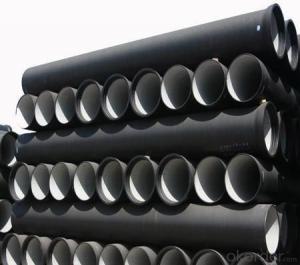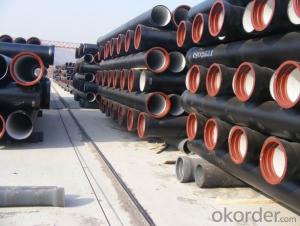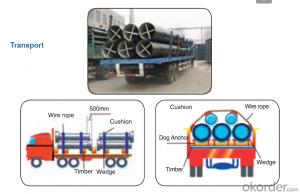Duct Iron Pipe DI Pipe ISO 2531 DN 80-300mm
- Loading Port:
- Tianjin
- Payment Terms:
- TT OR LC
- Min Order Qty:
- 100 m
- Supply Capability:
- 100000 m/month
OKorder Service Pledge
OKorder Financial Service
You Might Also Like
Specification:
1. size : DN80-DN2000 available with PN16 or PN10 or PN25 flanges
2.Standard : ISO2531/EN545/EN598/AWWA standard
3. WRAS Potable Water FBE Internal Lining
4.Material : Ductile iron
5.Technical: Casting
6. Type: Socket / flange PN10 / PN16 / PN25
7. Length=6m, 5.8m
8. Coating: Fusion bonded epoxy to 300 microns Dry Film Thickness
Portland cement lining internally and zinc-rich paint with not less than 70 microns bitumen externally
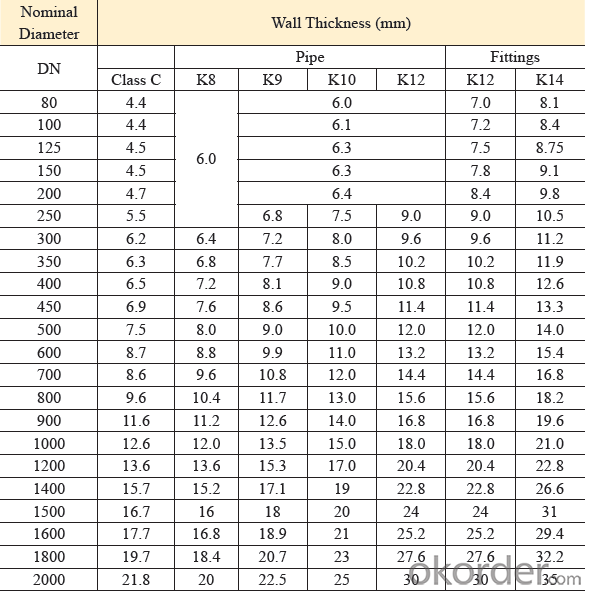
Quality:
ISO 2531 or EN 545 Standard K9 Class, K12 Class
1. ISO 9001 Certificate
2. ISO 2531 & EN 545 Certificate
3. WRAS Potable Water Certificate for FBE Internal Lining
4. WRAS EPDM Rubber Gasket or NBR Rubber Gasket
5. DN80mm - DN2000mm
6. Black Bitumen or Blue FBE / Epoxy Coating
7. Lengh = 6m or cut into 5.6m, 5.7m, 5.8m
8. Client's Brand Customization Allowable
9. Container or Bulk Loading / Shipping
10.Delivery within one Month or According to Client's Order Quantity
11. Support Client or The Third Party Inspection before Shipment
Standard Lining and Coating:
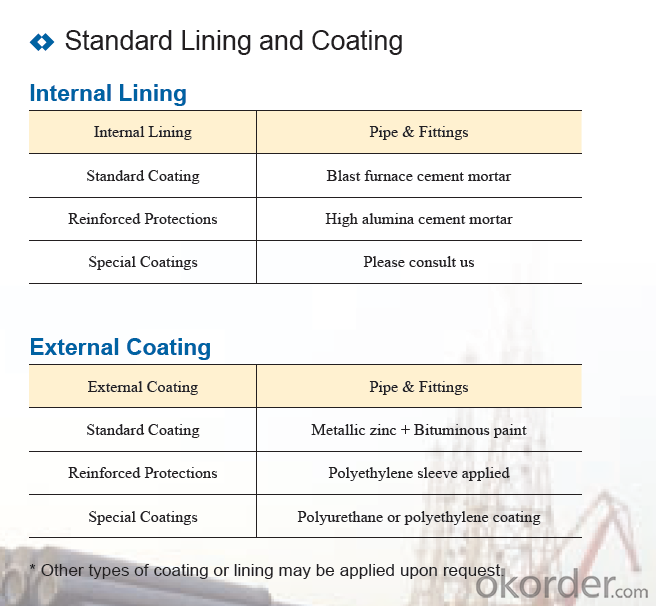
Transport:
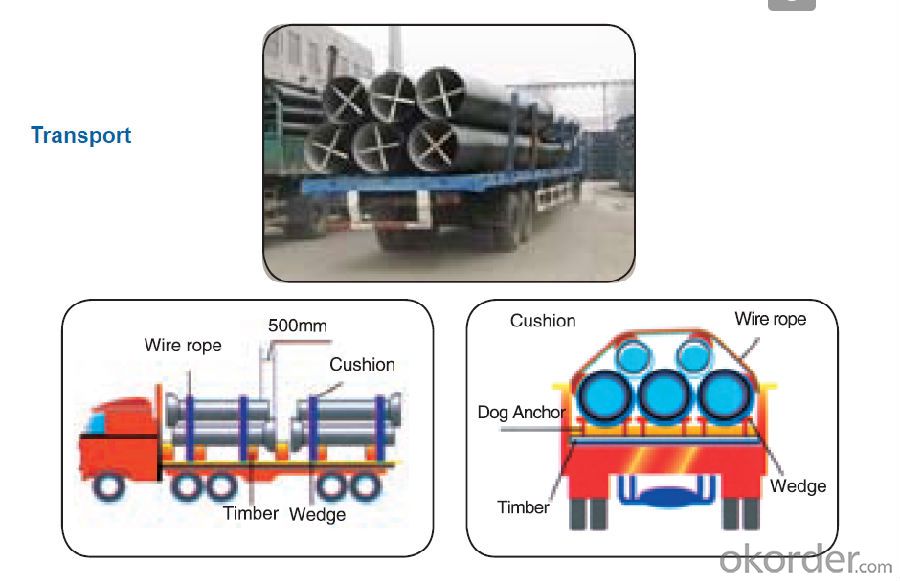
- Q:Can ductile iron pipe be used for sewer and wastewater systems?
- Yes, ductile iron pipe can be used for sewer and wastewater systems. Ductile iron is a strong and durable material that can withstand the harsh conditions of sewage and wastewater transport. It has excellent corrosion resistance and can handle high-pressure environments, making it a suitable choice for these applications.
- Q:What is the expected surge pressure rating of ductile iron pipes?
- The expected surge pressure rating of ductile iron pipes can vary depending on various factors such as the diameter and thickness of the pipe, the type of joint used, and the specific manufacturer's specifications. However, ductile iron pipes are generally designed to withstand surge pressures between 150% to 200% of their working pressure rating. This means that if a ductile iron pipe has a working pressure rating of, for example, 250 psi, it can typically handle surge pressures of up to 375 psi to 500 psi. It is important to consult the manufacturer's specifications and guidelines for accurate surge pressure ratings specific to the ductile iron pipes being used.
- Q:How are ductile iron pipes tested for quality?
- Ductile iron pipes are tested for quality using various methods to ensure they meet the required standards and specifications. One common test is the hydrostatic pressure test, which involves subjecting the pipes to water or other liquid under high pressure to check for any leaks or weaknesses. The pipes are typically filled with water and the pressure is gradually increased to a predetermined level. This test helps to identify any potential defects in the pipes that could compromise their integrity. Another important quality test for ductile iron pipes is the tensile test. This test involves pulling a sample of the pipe until it breaks, measuring the amount of force applied and the elongation of the sample. By doing so, the tensile strength and ductility of the pipe can be determined, ensuring it can withstand the required loads and stresses without deformation or failure. In addition to these tests, other quality checks include visual inspection, dimensional checks, and surface defect examinations. Visual inspection involves scrutinizing the pipes for any visible defects such as cracks, voids, or surface irregularities. Dimensional checks ensure that the pipes meet the specified dimensions and tolerances. Furthermore, ductile iron pipes are often subjected to corrosion resistance tests. This is done by exposing the pipes to different corrosive environments, such as saltwater or acidic solutions, to evaluate their resistance to corrosion. This is crucial as it determines the durability and longevity of the pipes, especially in applications where they may be exposed to harsh conditions. Overall, ductile iron pipes undergo rigorous testing to ensure their quality and performance. These tests help guarantee that the pipes meet the required standards, are safe to use, and are capable of withstanding the expected loads and environmental conditions they will encounter in their intended applications.
- Q:Are ductile iron pipes compatible with other pipe materials?
- Yes, ductile iron pipes are generally compatible with other pipe materials. Ductile iron pipes have a high level of flexibility and strength, making them suitable for connecting with different pipe materials such as PVC, HDPE, and steel. Transition fittings are commonly used to connect ductile iron pipes to other materials, ensuring a secure and leak-free joint. It is important to adhere to industry standards and guidelines when connecting different pipe materials to ensure compatibility and maintain the integrity of the pipeline system.
- Q:How does ductile iron pipe perform in areas with high groundwater levels?
- Ductile iron pipe performs well in areas with high groundwater levels. Its durable and corrosion-resistant properties make it suitable for such environments. The pipe's strength and flexibility allow it to withstand the pressure exerted by the groundwater and adapt to any ground movement without compromising its structural integrity. Additionally, ductile iron pipe's protective linings further enhance its resistance to corrosion, ensuring long-term performance in high groundwater areas.
- Q:Can ductile iron pipes be used in culvert or storm sewer applications?
- Yes, ductile iron pipes can definitely be used in culvert or storm sewer applications. Ductile iron pipes are known for their strength, durability, and flexibility, making them ideal for such applications. They have the ability to withstand heavy loads, resist corrosion, and handle high flow rates, making them a reliable choice for culverts and storm sewers. Ductile iron pipes also have a long service life and require minimal maintenance, further adding to their suitability for these applications. Additionally, ductile iron pipes can be easily installed and are available in various sizes and configurations to meet the specific requirements of culvert or storm sewer projects. Overall, ductile iron pipes are a proven and widely used option for culvert or storm sewer applications, providing efficient and long-lasting performance.
- Q:Are there any specific standards or regulations for ductile iron pipe?
- Yes, there are specific standards and regulations for ductile iron pipe. The American Water Works Association (AWWA) has established standards such as AWWA C151 for ductile iron pipe, which outlines the minimum requirements for manufacturing, testing, and installation. Additionally, various countries and regions may have their own specific regulations and standards for ductile iron pipe to ensure its quality and performance in different applications.
- Q:How does ductile iron pipe perform in extreme temperatures?
- Ductile iron pipe performs well in extreme temperatures due to its ability to expand and contract without cracking or breaking. It has a high thermal conductivity, allowing it to efficiently transfer heat without compromising its structural integrity. Additionally, its corrosion resistance properties make it suitable for both hot and cold environments, ensuring long-term performance even in extreme temperature conditions.
- Q:What are the different corrosion protection options for ductile iron pipe?
- To ensure the longevity and durability of ductile iron pipes, there are several options available for corrosion protection. These options are as follows: 1. Cement Mortar Lining: A layer of cement mortar is applied to the inner surface of the pipe, creating a barrier against corrosive elements in water or soil. This lining offers excellent corrosion resistance and can endure for many decades. 2. Polyethylene Encasement: The ductile iron pipe is wrapped with a layer of polyethylene material, which acts as a physical shield against external corrosive elements. This method is commonly employed in aggressive soil conditions and provides long-lasting protection. 3. Internal and External Coatings: Different types of coatings, such as epoxy, polyurethane, or fusion-bonded epoxy (FBE) coatings, can be applied to the inner and outer surfaces of the pipe to resist corrosion. These coatings form a barrier that prevents the pipe from corroding in the surrounding environment. 4. Cathodic Protection: An electrical current is utilized to safeguard the pipe from corrosion. Cathodic protection systems can be either galvanic (sacrificial anode) or impressed current systems. These systems control the flow of electrons, preventing the oxidation of the ductile iron pipe. 5. Zinc Coating: Also known as galvanizing, this method involves applying a layer of zinc to the surface of the ductile iron pipe. Zinc acts as a sacrificial anode, corroding instead of the iron pipe. Zinc coating is particularly effective in soil conditions with low resistivity, offering reliable corrosion protection. It is crucial to consider various factors such as the environment, water chemistry, soil conditions, and expected service life when choosing a corrosion protection option for ductile iron pipes. Consulting with corrosion protection specialists and engineers can assist in selecting the most suitable option for specific applications.
- Q:Comparison of ductile iron pipe and spiral steel pipe
- Ball milling cast iron pipe: corrosion resistance, high compressive strength, cheap, non pressure, socket connection.
1. Manufacturer Overview |
|
|---|---|
| Location | |
| Year Established | |
| Annual Output Value | |
| Main Markets | |
| Company Certifications | |
2. Manufacturer Certificates |
|
|---|---|
| a) Certification Name | |
| Range | |
| Reference | |
| Validity Period | |
3. Manufacturer Capability |
|
|---|---|
| a)Trade Capacity | |
| Nearest Port | |
| Export Percentage | |
| No.of Employees in Trade Department | |
| Language Spoken: | |
| b)Factory Information | |
| Factory Size: | |
| No. of Production Lines | |
| Contract Manufacturing | |
| Product Price Range | |
Send your message to us
Duct Iron Pipe DI Pipe ISO 2531 DN 80-300mm
- Loading Port:
- Tianjin
- Payment Terms:
- TT OR LC
- Min Order Qty:
- 100 m
- Supply Capability:
- 100000 m/month
OKorder Service Pledge
OKorder Financial Service
Similar products
New products
Hot products
Related keywords
